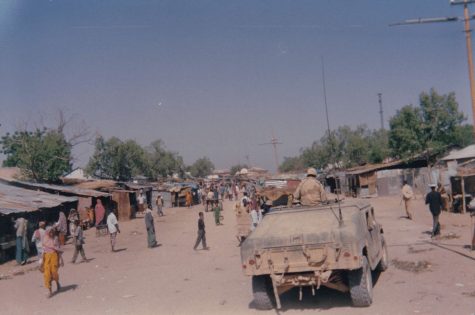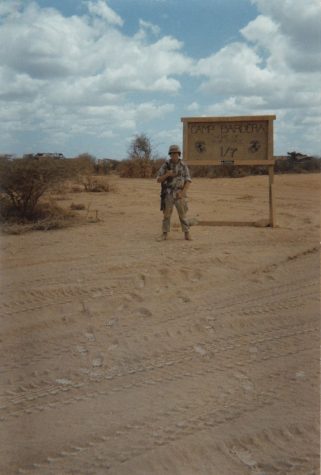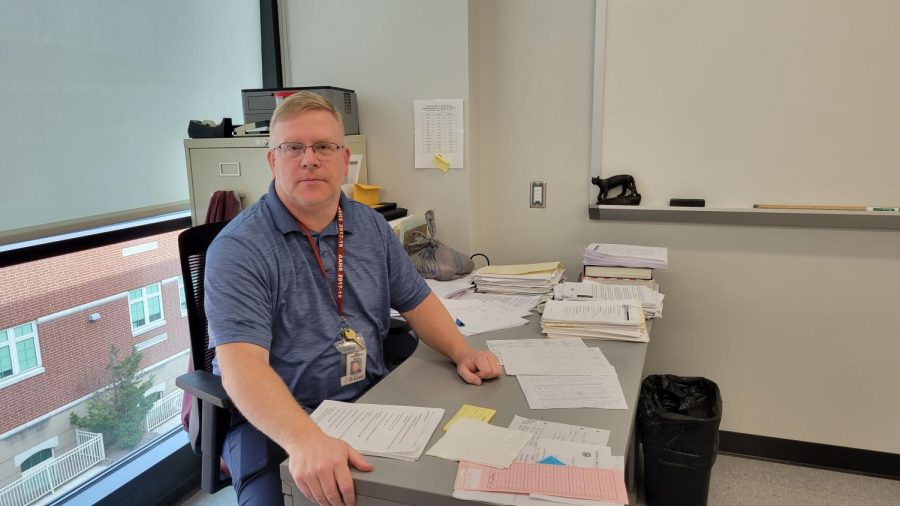Donald Dull

Name
Donald Dull
What was your highest rank?
I was a Sergeant, that’s E-5.
Which branch were you in?
I was in the United States Marine Corp.
What Military Occupation Specialty did you have?
3521, which was an Automotive Mechanic. I fixed vehicles from motorcycles to all the way up to 22 ½ ton tractor-trailers and everything in between.
Why did you choose that branch?
I had just dropped out of college for the first time back in 1989. College wasn’t for me. I was working two jobs, minimum wage. I was working as a landscaper and as a busboy/dishwasher at a restaurant. I wanted something better for myself, and a friend of mine joined the Marines as a reservist to pay for college. At the time, the Marine Corp recruiter was checking up on people who graduated in 1988 from Woodlands Hill High School, and I talked to her, and I saw an opportunity to better my position in life.
How long did you serve?
I did nine years active duty and one year in the reserve center up in Ebensburg, PA.
How long ago did you serve?
I got out in 2000.
How did you end up becoming a teacher after serving? Was that your initial plan after serving or did it change?
I reenlisted in 1994 and had then got transferred from my one duty station in California back to Japan, and I stayed there for two years. I became a sergeant, and the Marine Corp wanted me to do something other than being a truck mechanic, so they sent me to recruiting duty. I was the local recruiter here in Blair and Bedford County for the United States Marine Corp. I met my wife, who’s from here in Altoona, we got married and decided to start a family. She didn’t want to leave, and I love my wife, so I got out of the Marine Corp. She asked me what I was going to do now that I was out of the Marine Corp, and I told her I was going to college for Environmental Resource Management because I didn’t want to be in an office all day. Check water samples, do air-soil samples, that type of stuff, but I couldn’t do the math. So I had to do a quick pivot, and my wife’s a teacher, so she suggested I become a history teacher. And I changed my major from Environmental Resource Management over to Social Studies Education.
Is there anything you remember about your time in the service?
I remember the leadership I had, I remember having good people to work for and work with. That’s what makes the United States military a great place; it’s our people. Wherever you go, you may run into someone who isn’t a good leader or whatever, but you can make the best of that. My one Master Sergeant, David Guido, when I was in Japan, he kind of thrust me into being a leader. He told me, ‘We need to get this done. I don’t care how you get it done, I just want it done. And it has to be done right.’ So he put that emphasis on me to take that step forward. My captain when I was in California, Thomas Goben took really good care of us and he really cared about the men under his command when we deployed to Africa in 1992. And those are like the people you think about. The other experiences of going to different places and stuff, everyone has those stories, but my takeaway is it makes you a better person to interact with people from different places around the United States, interact with people from different regions around the world, and see that everybody is pretty much just the same, we just come from a different culture.
Where are some of the places you’ve been?
I did basic training in Parris Island, S.C., I did my school training to become a mechanic in Camp Johnson, N.C., I then went to Okinawa, Japan for a year, came back and was stationed at 29 Palms Calif. with the 1st Tank Battalion, after that, I went back to Okinawa, Japan for two years, then after there I went to recruiter school in Marine Corp base San Diego, and then I got stationed here in Altoona.
What does being in the military mean to you?

My takeaway was it helped me grow. I was an average kid in high school, I wasn’t an honors student, I wasn’t an AP student, just a general, average, run-of-the-mill kind of kid. I had an idea of what I wanted to do, I wanted to go to college, I wanted to make a ton of money, but I didn’t have the drive or the work ethic to do that. It showed when I dropped out of college for the first time.
What the military has done for me is it gave me time to grow up. It gave me the opportunity to lead and develop into my career. That’s what it comes down to: it gives you some structure and time to grow and learn about yourself, and become a better person.
Any tips for students going into basic training?
It’s 80% mental, 20% physical. If you’re any bit athletic at all in anything, you can do all the physical fitness. It’s the mental aspect. They are going to yell at you, a lot. Especially the Marine Corp. Everything you do is wrong, even if you’ve done it 100% right. They’re just trying to break you from your civilian life into what they want you to be. They’re going to change the way you walk, they’re going to change the way you talk, they’re going to change the way you dress. It’s not permanent, it’s just that you have to fit in with everybody else. Because they’re taking people from all over the country, all different walks of life, all different socio-economic status, and they’re taking people from other countries that are coming to the United States who want to join our military. So we have to bring everybody together and assimilate them into one unit. It’s just the mental aspect of it. It’s tough, it’s rough. My son’s in the Army now, and he went to high school here, went to college and found he wanted to do something else, and he decided to join the Army. He has found that you are finding people from all different walks of life, and you have to learn to work with each other. Just remember, the guy or lady to the right or left of you is going to be different than you, and you all have to work for the same goal. If you are looking at the military, remember, look at every branch. They all do what they do very well. But it is going to be a commitment, and the minimum commitment is going to be four years. And sometimes it seems long, but it’s going to go by fast, remember going into freshman year, and now you’re a senior, where did all the time go? You think it’s a long time, but it’s not. Look at your options, and don’t look at the military as the last option. The National Guard, they’ll pay for college. You can do the Army Reserves, they’re going to pay for college. If you want to do active duty and travel, when you’re done, they’re going to pay for college. It does set you up for a bit more. And people look at you a little differently after you’ve done your service. Because they look at you, and they expect that you are the image of the Army or the Marines. It will help you out in the future. But take a look at all the branches, even if you want to go officer and do Reserve Officer Training Corp program and college, look at those, those are wonderful ways of serving as well.
